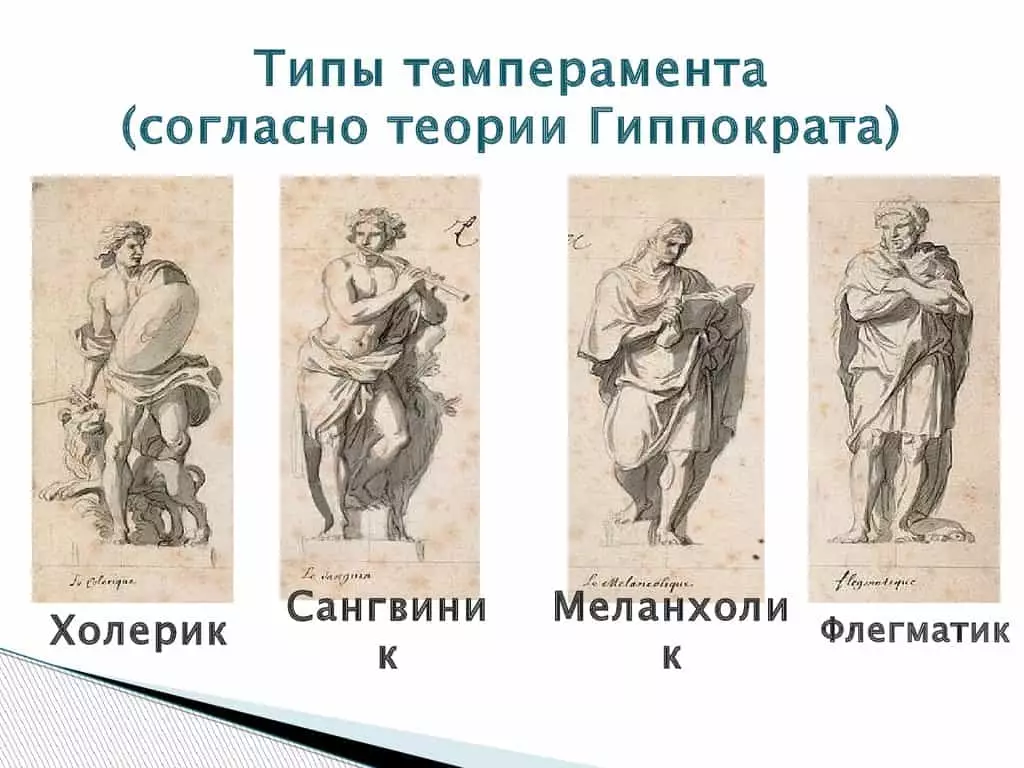Sanguine, choleric, phlegmatic, melancholic is 4 types of human temperaments. I am sure that the knowledge of temperament is unusually important, because it is from him that it depends on him to behave, and the reaction to the world around me, and the ability to interact with other people. I suggest find out everything about temperament your and your loved ones in the following material.

Temperament: what it is, its indicators
Today, it is probably difficult to find a person who could not answer the question: "Choleric, Sanguine, Phlegmatic, Melancholic - What is it?" But at the same time few people own full information on this topic, usually limited to general information. You need to urgently correct the situation!
Find out what awaits you today - a horoscope for today for all zodiac signs
By numerous subscribers requests, we have prepared an accurate horoscope application for a mobile phone. Forecasts will come for your zodiac sign every morning - it is impossible to miss!
Download free: Horoscope for every day 2020 (Available on Android)
Let's start with the establishment of the concept of "temperament". What it is?
In psychology temperament It is considered as a personal characteristic for which congenital innovative, that is, natural psycho-physiological properties. Temperament It also acts as an individual property of the personality due to its mental activity - intensity, speed and pace of mental processes.
In most temperament, it manifests itself in three spheres, namely:
- in the total activity indicator;
- in terms of the motor sphere;
- emotionality.
Consider all 3 indicators more details:
- Analyze The overall activity of the personality Helps the degree of intensity of its interaction with the outside world (nature and society). In this paragraph there are two border states: from bright manifested lethargy, passiveness before, on the contrary, excessively increased activity, rapid actions and reactions.
- Motor (either motor) Activity issues speed and sharpness in motion, manner to speak, external mobility or, on the contrary, slowness, sociability or closedness.
- To know On the emotionality of individual It is possible for rapidly changing emotional states, exposure to various emotions, mental sensitivity.
The teachings about human temperament were known since the time of antiquity. And they were always associated with physiology. The great healer of antiquity Hippocrates in the 5th century BC compiled a description of 4 temperament varieties (which we use to today).
He believed that the attitude to a specific temperament is depending on the dominant fluid dominant:
- Sanguits are blood;
- at cholerics - bile;
- Flegmatikov - mucus;
- And the melancholic is black bile.
Hippocrat considered temperaments solely from the position of physiology.
In the 18th century, our era conducted an analogy between hippocratic temperament varieties and four psychological types. This in turn and became the starting point in the in-depth study of this topic. Before this day, there have been no special changes since then. We all also associate a choleric temperament with aggressiveness, Sanguine - with love for life, phlegmatic - with a pacification, and melancholic - with longing and susceptibility.

Modern psychology finds under temperament The manifestation of stable and sustainable innate personal characteristics that affect the features of mental activity regardless of its content.
The following properties are attributed to temperament:
- extroversion;
- introversion;
- reaction rate;
- plastic;
- Rigidity.
Consider more detail.
Concepts Extraversion and introversion Instructed Karl Gustav Jung (who was a Swiss psychologist and philosopher). According to them, it is possible to establish how much the reaction and activity of the individual depends on the external causes (extroversion) is either provoked by deep psychological processes and experiences (introversion). Extraverts are Sanguines and cholerics, and introverts - phlegmatic and melancholic.
Reaction flow rate - Tells about the speed that mental processes and the mind reaction (fast mind, speech speed, gesture). This parameter rises from cholery, Sanguinics, sleek melancholic and decreases in phlegmatics and tired melancholic. A person who has a quick response against the background of low sensitivity (Sanguinik and choleric) does not realize that phlegmatic and melancholics do not manage to keep track of his thinking. As a result, incorrect conclusions are made regarding the intellectual data of the second category, which is very negatively affecting human relationships, especially a business character.
Low-effective – It acts as the degree of involuntary reactions to the external and internal influences and irritation (manifestations of criticism, offensive expressions, increase votes). Protection and orientation reaction data are automated. More active cholerics with sunguinics, low-active phlegmatic.
Activity - According to it, we obtain information about the energy potential of the individual used by them to overcome the obstacles, as well as the achievement of the goals. This indicator manifests itself as perseverance, purposefulness, concentration of attention. This is the main property of the temperament that is responsible for achieving the goals.
The most active in this parameter are phlegmatic, although their low reactivity does not allow you to quickly turn on. The owner of phlegmatic temperament almost never faces overwork. Choleric personalities are active, but they have reactivity. Sanguine is quite active, however, with monotonous activities, it is quickly tired. Melancholic is low-effective.
It is precisely on the ratio of reactivity with activity, we learn that most of all affects human activity: the circumstances of an external or internal nature - the mood, random incidents or goals, intentions, beliefs.
Plasticity and Rigidity Indicators We will tell about the skill Flexible adapt to exposure to the outside (plasticity) or inert behavior (rigidity). Sanguinics have the highest plasticity, and the rigids are phlegmatics, cholerics and melancholics.
According to emotional excitability - find out About the minimum impact that is needed to make an emotional reaction and at what speed it will develop. Sanguini, chorerics and melancholic are very emotionally excited, and phlegmatic has weak emotionality.
According to a special combination of activity that influences the intensity and the volume of interaction of the individual with the outside world (physical and social), as well as the degree of manifestation of emotions, learn about the individual characteristics of temperament - "Dynamic aspects of behavior".
Scientists are convinced that this parameter has a specific physiological basis - that is, there are some features of the functioning of physiological structures. It is also known that temperament is congenital, it builds a base of all personal properties, in particular, in nature. And under the formation of the latter temperament indicators become certain features of character.
Types of temperament and their characteristics
Having understood with what the temperament is, and also familiarized with its main components, it's time to find out the characteristics of the Sanguinique, choleric, phlegmatics, melancholic.Sanguinik
This type of temperament, according to Academician Pavlov, is the most "normal" of all. And all other temperatures he found deviations from this norm.
For the sanguine temperament, a strong and very mobile nervous system is characteristic. It provokes its increased ability to work and the ability to accurately perform different tasks. Also, such an individual is easily adapted to new conditions and people. It behaves in life actively, quickly, has active facial expressions, gesticulates well.
It has high sensitivity, which allows him not to be angry due to the little things, like, for example, it makes choleric. For the same reason, it takes the opinion of others to heart. It is a typical extrovert, which pays more attention to external objects than internal experiences.

Sanguins are distinguished by liveliness and expressiveness, they constantly strive to implement their impulses (desires, ideas). And do not tend to lose in doubt, preferring quick solutions. Thanks to the listed qualities, the Sanguinika can be called the most adapted and perfectly feeling in society. But he has a strongly developed "ego", as well as the ability to take control of his feelings and emotions. The actions of such people are always deliberate and are rational.
The ideal work of Sanguinikov - associated with people, but not involving too close contact. That is, this is the work of the seller or administrator, but not a psychologist or doctor.
Representatives of this type of temperament have an average learning ability, differ in surfactants in the skills acquired and knowledge. The same applies to the interaction with other people: the senses of the Sanguinik are also superficial and prone to pass quickly. Their leadership qualities are good, but not the best. In conflict situations, try to "go dry out of the water", and not solve the problem of physical disassembly.
Choleric
This type has a very strong, but completely unbalanced nervous system (the predominance of initiation processes over braking processes). This causes increased emotionality and strong response to external factors. His nervous processes flow even faster than the Sanguines, so cholerics are so fast and sharp in their movements.
Like a Sanguine, is an extrovert. It is always trying to implement his motives, in particular, its bright expression. If you see somewhere a person who is actively gesticulating all the time and looks in all directions, it has active facial expressions, know, this is exactly a choleric.
The cholerics are strongly reactive - that is, they quickly react to the external stimulation. Attract the attention of such personalities is not very difficult. Often they are too sensitively reacting even to messenger stimuli. A little less socially adaptive than Sanguins, the reason for which the surrounding often find their reactions are not entirely adequate. Possess the weak "ego": they are incredibly difficult to control their emotions and motivations. They are distinguished by strong emotionality, as well as irrational thinking.
Holers perfectly work in the media or in show business, because of them are excellent actors. They are often becoming musicians, artists, writers.
Proposed to superficial knowledge, not a common theory. In love, there are fervor, but their feelings are often quickly cooled. In relations, they are important for a certain drive, extreme, permanent new emotions. It is best for them to create a couple with other choleric and Sanguini. And the phlegmatic and melancholic can not tolerate this hot temperament.

Tell their elevated emotion, as well as irrational decisions again, are prone to lead. In conflicts, cholerics show all their mocked and, unlike Sanguits, often solve the problems "fists".
Phlegmatic person
This type has a strong, but an inert nervous system - that is, with great difficulty is derived from the state of equilibrium. These people are ideal for long and monotonous activity, which is completely not tired of them. But switch to something other phlegmatic is already hard.
Due to its slow nervous system, it often creates an impression slightly inhibited that in the behavior, which is in actions. It does not show active gesture, moves slowly, not very clever and fast. It seems that the new information "comes up for such a person. This is especially true of emotional manifestations.
It acts a typical introvert, more concentrating on its thoughts. Since phlegmatics, braking prevails over exciting, then they simply control their inner motivations and restrain emotions. But they accumulate affect: can restrain about a row several times, and then splashed the whole harness outwards.
Are quite adapted to society people. All their decisions in life are made only under the influence of common sense, logic and without the shadow of any emotions.
Representatives of this type of temperament are recommended to choose individual monotonous activities for themselves. So, they become excellent programmers, financiers, researchers, engineers, and so on.
Telling the long-term assimilation of new information and to the same slow establishment of relationships. But if they have already developed feelings for a person, they will continue for a very long time, perhaps even for life. It is phlegmatics who are stronger than others "stick" in humans. For love, they are most suitable for melancholics and Sanguinics, and with cholerics, they hardly understand each other.

Almost do not show leadership qualities. In conflict situations prefer the ignore method - they do not demonstrate their emotions to aggression. To make phlegmatics hit another person incredibly difficult, but if it happened, I just do not envy the victim.
Melancholic
We have already familiarized with the types of choleric, Sanguinik and Phlegmatic, it remains to talk only about Melancholic.
The nervous system of melancholic is weak, which speaks of their exposure to emotional supplies. They are not capable of long-term load and have a high distraction of attention. In addition, they tend to stick, looting in situations, save the resentment.
Perhaps you thought that the melancholic was easily given a concentration for certain purposes (sticking), but in reality, if such a person comprehends a failure, he ceases to make new attempts.
The melancholic temperament is the most sensitive to external factors. Therefore, such people notice what remains invisible to representatives of other temperaments. Often become beautiful empath.
Their nerve processes proceed quite actively, however, they mainly occur inside a person, and not outside. Externally, such personals can make the impression of a slightly braked, although, unlike phlegmatics, also emotionally overloaded. Melancholics are definitely introverts that are most concentrated on their emotions, and not thoughts, like, for example, phlegmatics. It does not have active facial expressions and gestures (or carefully hide their feelings).
Representatives of this type have a weak ego. They manage to cope with their expression, but they are unable to oppose their own impulses and emotions. For example, they are very hard in the morning to make themselves get out of bed, if they did not sleep.
Melancholics are the least socially adapted people. They are hard to have the establishment of communications with others, plus they often ignore social norms and rules. Very long get used to the new one. Such personalities are also distinguished by increased anxiety: even because of minor external incentives. Therefore, often suffer from various fears and phobias.

Melancholic is definitely rational than choleric, as it can cope with his emotions. It is shown to be engaged in individual activity in which there is no hard strain and clear deadlines. The creative activity is simply well suited, but not the actuality, as in the case of choleric, but the creation of a new one: designer, director, scientific figure.
This type is the most trained: comprehends the information quickly, and retains for a long time. In relations, they are most suitable for phlegmatics - as they are tightened to them. Capable to maintain long relationships.
As for leadership, then, although melancholic and possesses fairly good characteristics for him, but it is simply uninteresting. In conflict situations, prefer to slow down and suppress their true emotions.
Now you know who Sanguin, a choleric, phlegmatic, melancholic, and how they show themselves. Finally, it should be noted that in nature the net types of temperament are quite rare. As a rule, there is a connection of several types.
And to find out your type of temperament, I propose to take a test in the following video:
